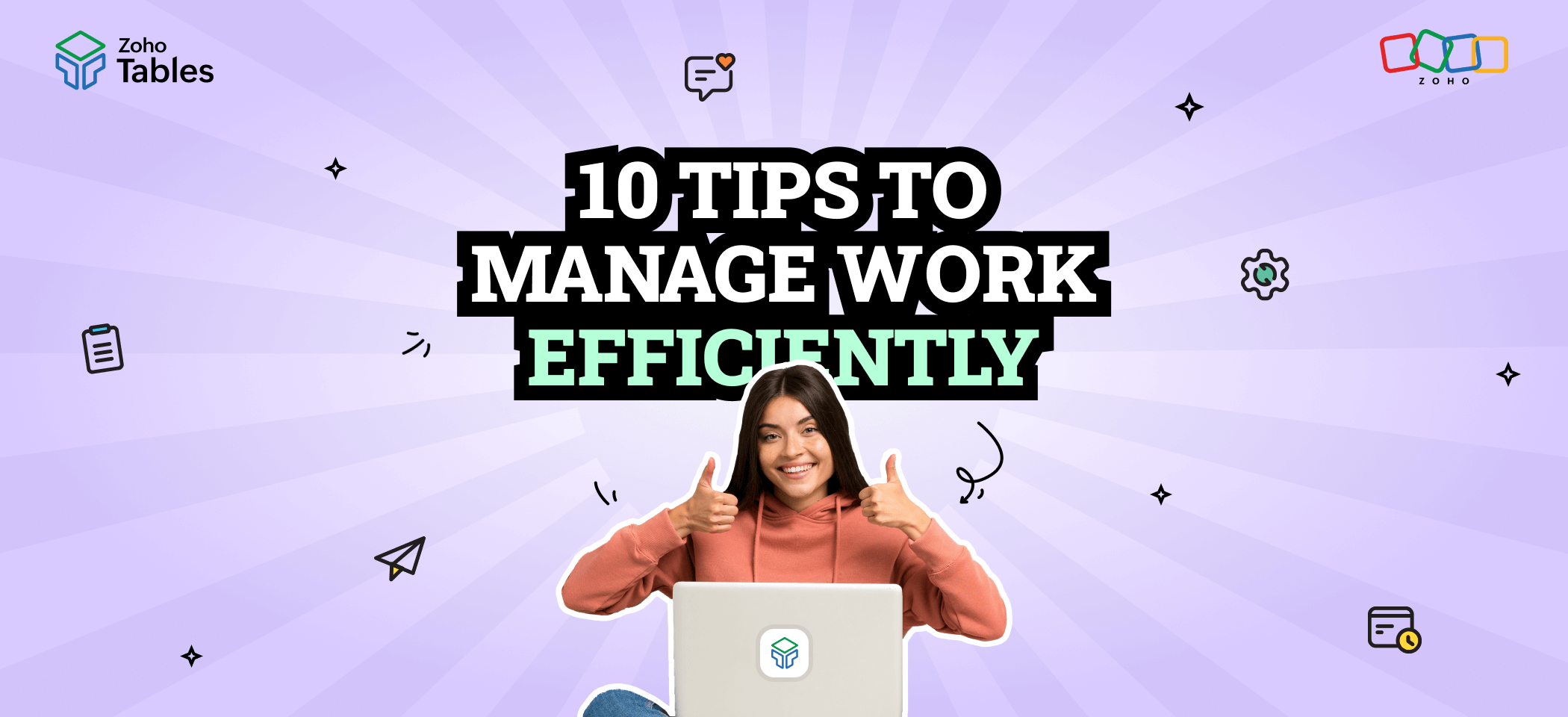- HOME
- Work Management
- How do you manage work to prevent burnout?
How do you manage work to prevent burnout?
- Last Updated : November 25, 2024
- 100 Views
- 5 Min Read

There are days when you feel like taking a day off work. It's normal and healthy to take small breaks. But what if this feeling lasts for days that become weeks and stretches into months? What if you no longer enjoy your job the way you used to? Are you unable to complete tasks the way you used to? These signs could be indications of work burnout.
What is work burnout?
Work burnout is a type of stress related to work that stretches over a long period. Don't confuse this with the occasional stress that occurs before work presentations, client meetings, or business events. Work burnout is a prolonged feeling that physically and mentally drains you. It's an invisible weight on your shoulders that decreases your productivity, alienates you from your colleagues, and creates negative feelings towards your work.
Burnout is more common than you think. With the rise in remote and hybrid jobs, the boundary between personal and professional lives has vanished. It isn't uncommon to see professionals opening their laptops at family trips and friendly gatherings. The "hustle culture" has glorified overworking, and burnout has slowly and quietly crept into our lives.
Common signs of burnout
1. Exhaustion
This is the first indication of burnout. You find it hard to concentrate at work. Working in high-pressure work environments, chasing aggressive targets, and dealing with intense time pressure leads to a lack of control over your work. It becomes a Herculean task even to show up at work every day. Exhaustion also leads to forgetfulness. You'll find it hard to keep track of your deliverables and deadlines.
2. Cynicism
Everything that seemed fun earlier begins to get on your nerves. You mentally detach yourself from your work and colleagues. You no longer participate in team events or fun activities. There's a constant battle in your mind about whether you should quit your job or not. Other signs include questioning the value of your work, doubting your skills, and feeling dissatisfied with your work. Promotions, hikes, and awards will seem pointless.
Cynicism can either stem from overwork or constant conflicts within your team. If it's not addressed in the early stages, it will lead to unpleasant situations with your colleagues, customers, or clients.
3. Inefficacy
Another noticeable sign is feeling incompetent and experiencing a dip in productivity. Even after spending long hours on your laptop, you still get little to no work done. You find yourself procrastinating or missing deadlines. The issue gets worse when you work in silos, and your teammates don't give constructive feedback or recognize your work.
There are also physical signs of work burnout, like fatigue, frequent headaches, sleeplessness, and loss of appetite.
Can you prevent or recover from burnout?
Yes, you can. However, the way you approach it depends on the factors causing your burnout. If you're dealing with factors beyond your control, such as a toxic work culture with unrealistic expectations, a lack of recognition, and no scope for growth, the answer, although not easy, is simple: Find another job.
But if poor work organization is causing you burnout, we're here to help. In this blog post, we’ll focus on how to prevent or overcome burnout by improving work management.
6 simple strategies to prevent or recover from burnout
1. Prioritization
Not all of the items on your agenda require equal attention. It's important to prioritize your tasks based on deadlines or urgency. It will put your mind at ease, and the pile of tasks on your calendar won't seem so daunting anymore. It will also give you more space to concentrate on your personal goals.
2. Collaboration
A team isn't built with just one person. When teammates work in silos, it can be difficult to tell who is underworked or overworked. It leads to a lack of clarity in work roles and decreased productivity. A team can work efficiently only when each member knows what's expected of them. When they distribute their work evenly, they create a healthier work atmosphere.
3. Set realistic goals
Never add new assignments on top of unfinished ones. It's important to set healthy boundaries on your team. When you have too many items on your plate, you'll resort to multitasking, which will eventually lead to bottlenecks. Be realistic about the time you need to complete each task and set your goals accordingly.
4. Open communication
Don't hesitate to talk about how you feel. It's important to have an open discussion with your colleagues about why you feel burned out. Is it because of overwork? A conflict with your colleague? Or a lack of empathy? It's never healthy to bottle up your emotions. Some organizations even have counselors to help you get through this phase.
5. Celebrate small wins
Acknowledge your wins at work. Even if it's something as simple as finishing all of your tasks for the day, celebrate it. It will boost your self-confidence and keep you motivated at work. The release of dopamine in your brain sharpens your attention and elevates your mood. If you have a journal, note down all of your small wins. At the end of each month, you'll be proud of what you have accomplished.
6. Use a work management tool
Sticking a note on your cubicle wall with a list of tasks might seem simple, but modern work management tools address all aspects of work holistically and are better equipped to prevent work burnout. A comprehensive work management tool like Zoho Tables helps you track work efficiently, collaborate with colleagues contextually, organize work data, and automate mundane tasks. You can also visualize work data in several ways with views such as calendar, kanban, grid, gallery, and form. It enables you and your team to stay productive, break silos, and streamline workflows.
Enjoy your work and your life
"Balance is not something you find; it's something you create."—Jana Kingsford, The Big Dreams Genie.
The best way to tackle burnout is by striking a healthy balance between work and life. Adopting digital tools offers you the flexibility and support that you deserve to restore your physical health and mental peace at work.
 Archanaa
ArchanaaA fantasy writer who found a home in product marketing.

